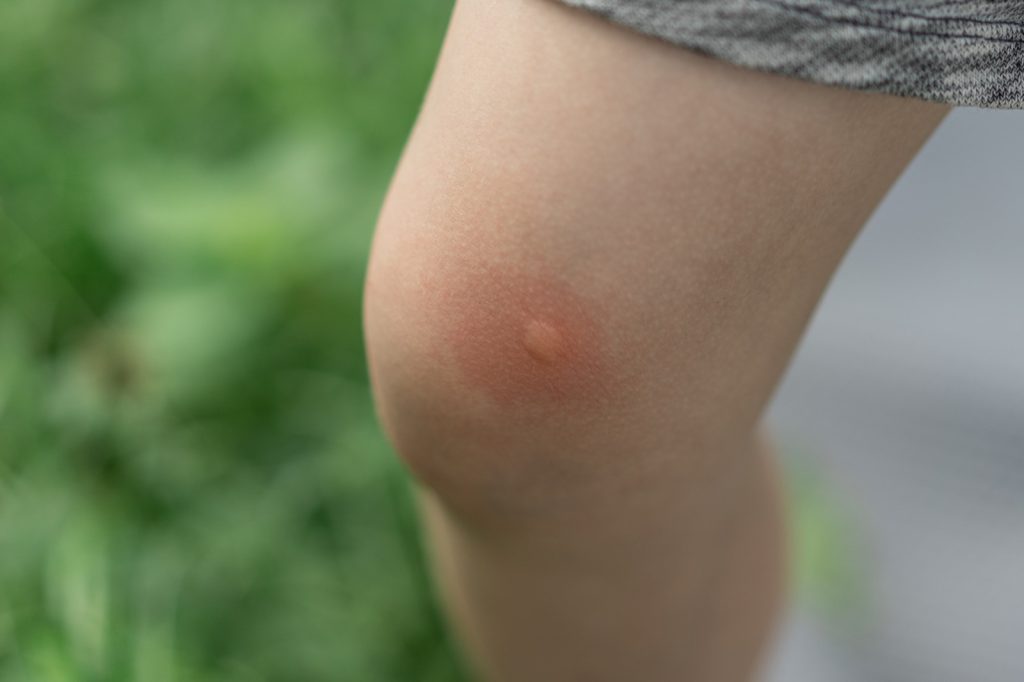
Insect bites are common, especially during warmer months when people spend more time outdoors. Most insect bites are harmless and cause only minor discomfort. However, some bites can become infected, leading to more severe symptoms and requiring medical attention. This article will guide you on recognising the symptoms of an infected insect bite, understanding what an infected insect bite looks like and how to get an infected insect bite treatment in Farnham Common.
Symptoms of an Infected Insect Bite
An insect bite usually causes redness, swelling and itching. These symptoms are generally mild and subside within a few days. However, if the bite becomes infected, more serious symptoms can develop. Common symptoms of an infected insect bite include:
- Increased Redness and Swelling: The area around the bite becomes more red and swollen than usual.
- Pain: The bite site becomes increasingly painful to the touch.
- Warmth: The skin around the bite feels warm, indicating inflammation.
- Pus or Discharge: A yellow or greenish fluid may ooze from the bite.
- Fever: A low-grade fever can develop as your body fights the infection.
- Swollen Lymph Nodes: Lymph nodes near the bite, such as in the neck, armpit or groin, may become swollen.
- Streaking Red Lines: Red lines that run from the bite towards the heart can indicate that the infection is spreading.
If you experience any of these symptoms, it is important to talk to our pharmacists promptly and get insect bite treatment in East Burnham.
What Does an Infected Insect Bite Look Like?
Insect bites are usually harmless and result in minor symptoms like redness, itching and swelling. However, if an insect bite becomes infected, it can present more severe symptoms that require medical attention. Here are some visual cues to help you identify an infected bite:
- Intensely Red Area: The redness extends beyond the initial bite site and looks more severe.
- Swollen and Raised Skin: The swelling is more pronounced and the skin may feel firm to the touch.
- Blisters or Sores: Blisters or open sores may form around the bite.
- Pus-Filled Bump: A raised bump filled with pus can develop at the bite site.
- Discolored Skin: The skin around the bite may turn darker or have a purple tint.
How to Know if an Insect Bite is Infected
Sometimes an insect bite can become infected, leading to more severe symptoms and requiring medical attention. It’s important to differentiate between a normal reaction to an insect bite and an infection. Here’s how to know if an insect bite is infected:
- Duration: If the bite’s redness and swelling do not start to improve within a few days or get worse, it could be infected.
- Pain: Increasing pain, especially if it spreads beyond the bite area, is a sign of infection.
- Systemic Symptoms: Symptoms like fever, chills or body aches suggest the infection is affecting your whole body.
Treatment for Infected Insect Bites
Infected insect bites require prompt and effective treatment to prevent complications and promote healing. If you suspect an insect bite is infected, follow these steps to treat insect bites:
- Clean the Area: Gently wash the bite area with soap and water to remove any dirt and bacteria.
- Apply an Antiseptic: Use an antiseptic solution or cream to disinfect the area and prevent further infection.
- Use a Cold Compress: Apply a cold compress or ice pack to reduce swelling and alleviate pain. Wrap the ice pack in a cloth to avoid direct contact with the skin.
- Take Over-the-Counter Medication: Non-prescription pain relievers like ibuprofen or acetaminophen can help reduce pain and inflammation. Antihistamines can relieve itching.
- Apply an Antibiotic Ointment: Use an over-the-counter antibiotic ointment on the bite to fight the infection.
- Keep the Area Covered: Cover the bite with a clean bandage to protect it from further irritation and prevent scratching.
- Monitor the Bite: Keep an eye on the bite for any signs of worsening infection. If symptoms do not improve within a few days, seek medical attention.
Preventing Insect Bite Infections
Preventing insect bite infections is important to avoid the discomfort and potential complications that can arise from infected bites. Here are some practical tips to help you prevent insect bites and subsequent infections:
- Avoid Scratching: Scratching can introduce bacteria into the bite, increasing the risk of infection. Keep your nails short and clean to minimise damage if you do scratch.
- Keep the Area Clean: Regularly clean the bite area with soap and water, especially if it becomes dirty.
- Use Insect Repellent: Apply insect repellent when spending time outdoors to reduce the risk of being bitten.
- Wear Protective Clothing: Long sleeves, pants and socks can provide a barrier against insects.
- Stay in Insect-Free Areas: Use screens on windows and doors and avoid areas with high insect activity, especially during peak times like dawn and dusk.
Schedule a Consultation with Pharmacy First at Aroga Pharmacy in Farnham Common
Infected insect bites can cause discomfort and lead to more serious health issues if not treated properly. By recognising the symptoms of an infected insect bite, knowing what an infected insect bite looks like and following the appropriate treatment steps guided by our pharmacists in Farnham Common, you can effectively manage and treat these infections.
With proper care and precautions, you can reduce the risk of insect bite infections and enjoy your time outdoors safely. If you’re experiencing symptoms of an infected insect bite, Aroga Pharmacy is here to help.
For those in Farnham Common, East Burnham, Stoke Poges, and Taplow, schedule a consultation for advice and treatment options tailored to your needs. Our knowledgeable pharmacists will provide personalised care to ensure a swift recovery.
